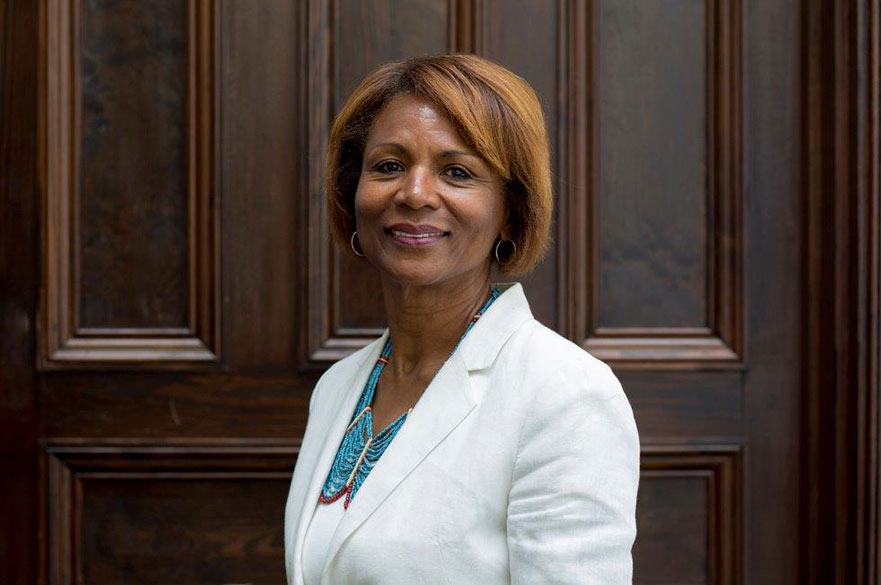Lorna Holder – the NTU fashion alum with style in her DNA
Given Lorna Holder's 40 years' experience as a fashion designer, producer, writer and curator, it's difficult to do her career justice in 900 words. Lorna produced the Hanging Out documentary (with accompanying V&A display exploring 1950s and 1960s youth culture), curated the acclaimed Jamaica Hidden Histories exhibition, and authored the book Style in My DNA.
By John Anderson | Published on 23 February 2023
Categories: Alumni;

Graduating from Nottingham Trent University with a BA Honours in Fashion and Textiles in 1975, Lorna has worked in fashion and retail in London, New York and the Middle East. Previously a designer for the Birmingham-based design company, House of Lerose, she was Head of Fashion for Davies & Fields in the 1970s and 80s – one of Britain's largest dress manufacturing companies – and a role Lorna considers to be her proudest achievement.
Lorna is also a member of the Board of Governors at Nottingham Trent University and is the Managing Director of Full-Spectrum and Tuareg Productions.
What shines through when you talk to Lorna, is not just her love of fashion, but her real sense of optimism and positivity towards the industry. How were her days as a student?
“I can clearly remember my studies,” Lorna says. “I left Nottingham and headed for London, securing a job within a week. What stands out for me though was the feeling that I’d studied at this amazing place, surrounded by wonderful friends and lecturers, but now I’d graduated and was out there on my own.”
Lorna subsequently discovered she had been the first black student to graduate from the Fashion and Textiles course. Did that feel significant at the time?
“I didn’t really think about those things,” she says. It’s only recently – when I did my research – I realised. It was kind of unheard of for a black girl to go and study fashion back in the 1970s. For many women, you were expected to leave school and learn shorthand and typing or perhaps train to become a nurse – not that there’s anything wrong with those careers! I was fortunate in having a really strong and supportive family around me, and a clear idea of what I wanted in life.”
On the whole, Lorna’s experiences of growing up in the UK in the 60s and 70s were positive.
“Of course, I was aware of discrimination in society in those days, but I concluded it was simply because you were perceived to be different. It wasn’t necessarily because of the colour of your skin, it was because you might speak differently, dress differently, or perhaps have a different outlook. As an individual looking to navigate through it all, you have to be bigger than that.”
Clearly, Lorna has a passion for fashion and textiles. Was that always the case?
“It was indeed,” she says without hesitation. “I was fortunate that I’d had young aunts and uncles in the 1960s who used to buy a lot of clothes and look very stylish. Many of those garments were given to me as a teenager – all the latest mod dresses. I liked to sew and draw, which all helped when I became a student. Then at the age of 20 after my first year of studies – 1973 – I took the opportunity to apply for a work permit to go and work in New York, during the summer holidays. It was one of the best decisions I’ve ever made because it made me step out of my ‘normal’ surroundings and experience the fashion industry in action.
“I was due to work for a fashion house over there, but that opportunity fell through. So instead, I applied for a job at Bloomingdales, which my family in New York didn’t think I’d get – but I was successful! Working there was another great experience – and taught me a very valuable lesson – that fashion was indeed a business.”
Our interview with Lorna coincides with International Women’s Day. Who does she feel were the biggest influences in her life?
“The person who inspired me the most was my great-grandmother,” Lorna says affectionately. “She was a very stylish person of Syrian and African heritage. In the early 1900s, alongside my great-grandfather, she’d travel around the Caribbean to Cuba, Panama, Costa Rica, before heading back to Jamaica.
“By travelling from one location to the other, they had to learn a different language and interact with people from a variety of cultures. When they finally moved back to Jamaica, many people were indifferent because their children mostly spoke Spanish, which created friction.
“My great-grandmother always tried to instil in me the idea that differences were something you should try to understand and embrace. And to never be fearful. I’ve always carried that with me.”
Our conversation with Lorna ends as it began – optimistically.
“When I meet and work with students today, they tend to mix and get on with each other – whatever their ethnicity or wherever they’re from,” Lorna says. “From my own personal experiences, it’s when people get older and have other pressures that class and race can sometimes become a bigger factor. But certainly, the student experience today is incredibly inclusive and welcoming. We can learn a lot from the modern generation.”
Are you a member of the NTU alumni and supporter community?
Update your details now and stay connected with our latest news and events and gain access to a wide range of exclusive benefits and services.